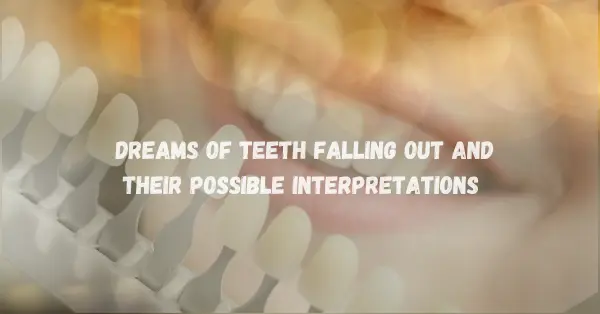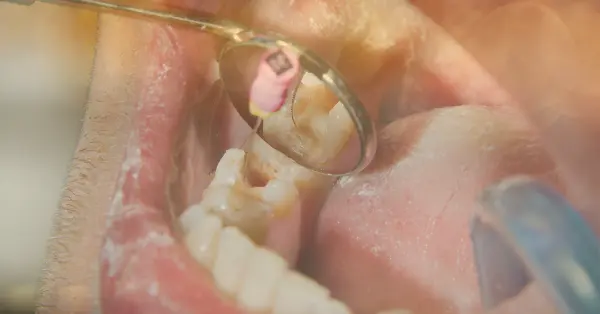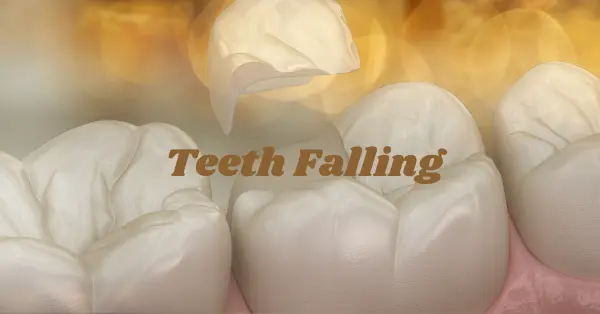Teeth falling out in dreams is a common indicator of uncertainty and anxiety related to control or self-image. On the other hand, it may represent metamorphosis, denoting important life adjustments or personal development as one lets go of the past and welcomes the present.
Table of Contents
TogglePossible Interpretations for Teeth Falling Out Dreams
⫸Insecurity: Feelings of vulnerability in relation to one’s confidence and self-image.
⫸Anxiety: Shows tension or a fear of losing control over some areas of life.
⫸Transformation: Denotes a shift from the old to the new, signifying important life changes or personal development.
⫸Communication Problems: Indicates a difficulty expressing oneself or a sense of being misinterpreted in social settings.
⫸Fear of Aging: Refers to worries about becoming older and the accompanying physical changes.
⫸Loss of Power: Indicates a sense of being powerless or unqualified in a certain circumstance.
⫸Letting Go: Denotes the necessity of releasing old routines, connections, or feelings to welcome fresh starts.

Why Our Teeth Appear in Dreams
Dreams frequently feature teeth as representations of communication, self-image, and control. Their passing can be interpreted as a sign of instability or helplessness, raising questions about our own and other people’s perceptions of us. Teeth-related dreams can also represent changes and development, expressing worries and anxieties that we would not face in the real world. Teeth are significant in dreams because they may symbolize death, rebirth, or loss in certain cultures.
Teeth Falling out Dream Meaning Money
Teeth-falling dreams are frequently associated with financial worries and issues. The following are some interpretations of this theme:
- Financial Anxiety: Dreams of this nature may represent concerns about one’s ability to maintain financial stability or about potential financial losses.
- Value Perception: Losing teeth can imply sentiments of diminished self-worth or worries about one’s financial condition.
- Change in Wealth: Losing teeth in a dream may portend an impending adjustment to one’s financial situation, either positively or negatively.
- Fear of Insecurity: This dream can symbolize worries about one’s ability to maintain financial security in the future and the necessity to review one’s financial plans.
- Letting Go of Materialism: On the other hand, it might represent a desire to let go of a connection to wealth or material belongings, pointing to a change of perspective towards appreciating the more significant aspects of life.
Freud and Jung on Teeth Dreams
⋙Sigmund Freud: According to Freud, dreams are reflections of unconscious anxieties and suppressed desires. He believed that nightmares in which teeth fall out frequently represent anxieties related to masculinity and sexuality. Such nightmares, in Freud’s opinion, may represent feelings of powerlessness in sexual interactions or dread of castration. Additionally, he suggested that worries about aging and loss of vitality can be reflected in tooth loss.
⋙Carl Jung: Jung approached dreams more symbolically, viewing them as manifestations of archetypal imagery and the collective unconscious. He interpreted teeth falling out in dreams as expressing transition and rebirth, signifying a shedding of previous identities or aspects of the self. Jung felt that these dreams might also suggest a need to tackle worries related to self-worth and personal progress, advising individuals to welcome changes and let go of former beliefs.
While both psychologists acknowledged the emotional and psychological relevance of teeth dreams, they took distinct approaches to their interpretations, with Jung emphasizing personal growth and transformation, and Freud concentrating on sexual anxiety.
How can I stop having dreams about my teeth falling out
There are a few tactics you might think about if you want to avoid having recurrent dreams involving your teeth falling out:

Practice Relaxation Techniques
- Suitable Sleep Position: Avoid stimulants like caffeine and electronics before bedtime, and maintain a consistent sleep schedule with a comfortable sleep environment. Good sleep hygiene may improve sleep quality and reduce nightmares.
- Relax Before Bed: Engage in peaceful activities like yoga, meditation, or reading to reduce anxiety and promote a calm state before sleep.
Reframe Your Dreams
- Set Intentions: Consciously visualize positive scenarios before sleep. This can help redirect dream content away from distressing themes by focusing on comforting or peaceful images.
Address Physical Factors
- Dental Health Check: If issues like bruxism (teeth grinding) are suspected, consult a dentist. They can recommend solutions like a night guard to protect against teeth grinding and possibly reduce related dreams.
Seek Professional Help
- Therapy: If the dreams cause frequent distress, consider seeing a therapist. They can provide coping mechanisms and help explore underlying psychological concerns contributing to these dreams.
Teeth Falling Out Dreams Linked to Life Events
Dreams in which teeth fall out are frequently associated with certain experiences or changes in life; they represent emotions such as tension, insecurity, or a fear of losing control. Traumatic events such as job changes, relationship difficulties, or aging might cause these dreams, reflecting unconscious fears. Alternatively, as part of a more profound emotional change, these dreams could symbolize personal development, metamorphosis, or the letting go of old habits. The background of your present situation may provide some insight into the significance of these recurrent nightmares.
Gaining Insight from Teeth Falling Out Dreams
Teeth-losing dreams might be an invaluable resource for understanding your daily life. These dreams can be used for introspection and personal development in the following ways:

- Identify Sources of Anxiety
Reflect on the emotions in your dream. Feelings of insecurity or helplessness may point to stressful life events like transitions, relationship challenges, or career shifts. Recognizing these stressors can help you manage them better in waking life. - Assess Communication Challenges
Teeth are often linked to self-expression. Losing teeth in a dream may suggest communication difficulties in real life, prompting you to evaluate how well you express your thoughts and whether you’re avoiding important topics. - Explore Personal Growth Opportunities
Teeth falling out can symbolize personal growth or transformation, signaling a significant turning point in your life. Consider the areas of change and how you can approach these shifts with a positive mindset. - Encourage Self-Reflection
Use these dreams as an opportunity for introspection. Ask yourself: Am I satisfied with my life? Where do I feel stuck? This self-reflection can lead to greater self-awareness and inspire meaningful changes. - Consider Physical Health Factors
Sometimes, dreams about teeth falling out are connected to physical health, particularly dental care. If you’ve been neglecting your oral hygiene, this dream may serve as a reminder to prioritize your health. - Embrace Change as a Positive Force
Carl Jung viewed teeth falling out in dreams as a symbol of rebirth, representing new beginnings through major life changes. Embrace change as an opportunity for growth, even if it’s initially challenging.
Nine Potential Causes of Tooth Loss
◗Periodontal Disease
Gum disease and inflammation can demolish the supporting structures of teeth, leading to tooth loss.
◗Dental Decay
Cavities can progress to the point of irreversible damage, resulting in lost teeth.
◗Inadequate Dental Care
Poor brushing and flossing habits increase the likelihood of dental problems and plaque buildup.
◗Use of Tobacco
Smoking and chewing tobacco can exacerbate gum disease and reduce blood flow to the gums.
◗Diabetes
Unmanaged diabetes heightens the risk of infection and gum disease.
◗Hormonal Changes
Conditions like menopause or pregnancy can impact gum health, increasing sensitivity to disease.
◗Genetic Factors
A family history of dental issues may make tooth loss more likely.
◗Age
The risk of tooth loss increases with age due to cumulative wear and heightened susceptibility to diseases.
◗Nutritional Deficiencies
Insufficient intake of essential nutrients, particularly calcium and vitamin D, can weaken teeth and bones, increasing the risk of loss.
Conclusion
Teeth falling out in dreams is frequently a symptom of underlying fears or grief. This typical dream may represent worries about aging, communication problems, or one’s own perception of oneself. However, it can also represent change or the necessity of personal development.
In this sense, losing teeth might stand for letting go of long-standing ideas or habits in favor of fresh starts. These dreams promote self-reflection and the chance to confront underlying concerns and goals, regardless of whether they are seen as a symptom of insecurity or as a catalyst for progress. In the end, the interpretation may change depending on the circumstances of each person, yet both elements can provide insightful information about a person’s emotional condition and personal journey.
FAQs
What advantages can mindfulness training offer?
Reducing stress, enhancing focus, regulating emotions better, and promoting general wellbeing are all possible with mindfulness.
How can I begin a garden that is sustainable?
Start by learning about native plants, applying rainwater collecting, using organic soil, and staying away from toxic pesticides.
Which behaviours indicate emotional intelligence?
Self-awareness, empathy, good communication, and emotional regulation are important indicators.
What effects does technology have on social relationships?
Technology can improve communication, but it can also result in less in-person connections and feelings of loneliness.
What advantages does regular exercise provide for your health?
Frequent exercise can lengthen life, strengthen immunity, improve mood, and improve cardiovascular health.
What makes cultural variety crucial?
Cultural diversity brings a variety of viewpoints and ideas to communities, which stimulates creativity, understanding, and enrichment.
How can I become a better time manager?
To increase your efficiency, prioritise your work, set clear goals, use calendars and other tools, and create routines.
How does sleep affect one’s mental state?
Emotional control, cognitive performance, and general mental health all depend on getting enough sleep, which also lowers the chances of sadness and anxiety.
How can I be grateful every day?
To develop a grateful mindset, write in a gratitude diary, think back on your experiences, and show appreciation to others.
What effects does the changing climate have on wildlife?
Climate change raises the risk of extinction for many species, endangers their habitats, and modifies their migratory patterns.










